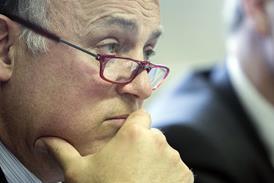- Royal College of Physicians warned Dudley Group FT it needed to fix a “breakdown in relationship” between A&E consultants and trust board
- Concerns over acute medical wards being used as a “dumping ground”
- Latest in a series of reports into the trust’s A&E department and wider culture
A struggling trust has been warned about a “breakdown” in the relations between its executive board and emergency consultants.
In an independent review, the Royal College of Physicians has told Dudley Group Foundation Trust that it will not achieve improvements needed to its accident and emergency department until relationships are repaired, HSJ understands.
The royal college review is the latest in a series of probes into the trust’s emergency department and wider culture (see timeline below), including a separate review which has found bullying allegations against some of its executives to be unsubstantiated.
According to several sources, the unpublished royal college review highlighted concerns that acute medical wards were being used as a “dumping ground” by the emergency department and report that A&E nursing staff felt “vulnerable” and unsupported by consultants.
The trust received a final version of the report in January.
The provider has declined to share a copy, but multiple sources said it also found;
- that A&E and acute medicine consultants were not working together effectively;
- some changes had been introduced by the trust board without engagement with the consultant body; and
- there was no culture of learning or strong governance within the department.
The review was commissioned in May last year in response to several concerns raised by the Care Quality Commission about the safety of the trust’s emergency department.
Diane Wake, the trust’s chief executive, said: “Our medical director Julian Hobbs commissioned the Royal College of Physicians to undertake an independent service review of our adult emergency medicine service and this was undertaken between 17 and 18 May 2018.
“We accept the report and its findings. Our senior consultants in our emergency department and urgent care have the report to form an action plan to address the issues raised.
“However, the report represents a point in time. The clinical leadership of the department has changed, and many of the recommendations have already been put in place. In the past year, we have seen patient outcomes improve, including sepsis mortality, falls, pressure ulcers, hospital acquired infections and never events.”
Timeline of Dudley Group stories
May 2018: Trust commissions the Royal College of Physicians to review the emergency department.
July 2018: After a follow-up inspection, the CQC publishes a focussed report into the A&E, highlighting serious concerns over staffing levels and failures to spot deteriorating patients.
July 2018: Trust chair receives a letter from 42 senior clinicians raising concerns about executive board members.
August 2018: Trust chair and NHS Improvement commission Capsticks to carry out independent investigation into the claims.
August 2018: Trust commissions independent review into A&E deaths, following the CQC report in July.
September 2018: CQC publishes a second report into the A&E, again raising serious safety concerns. HSJ reveals the trust also received four formal warnings from the regulator from December 2017 to August 2018.
January 2019: The independent review of A&E deaths raises concerns over eight cases, but concludes that more than 90 per cent of the deaths reviewed were unavoidable.
February 2019: Trust chair Jenni Ord announces her departure, after MPs raise concerns over her reappointment.
March 2019: HSJ reveals key findings from the Royal College of Physicians report, including a breakdown in relations between the board and A&E consultants.
March 2019: Capsticks report into whistleblowing allegations is published, describing allegations of bullying and harassment as unsubstantiated.
Source
Information provided to HSJ
Source Date
8 March 2019
Review clears trust leaders of 'bullying and harassment'
- 1
- 2
 Currently reading
Currently reading'Breakdown in relations' between A&E consultants and board



























4 Readers' comments